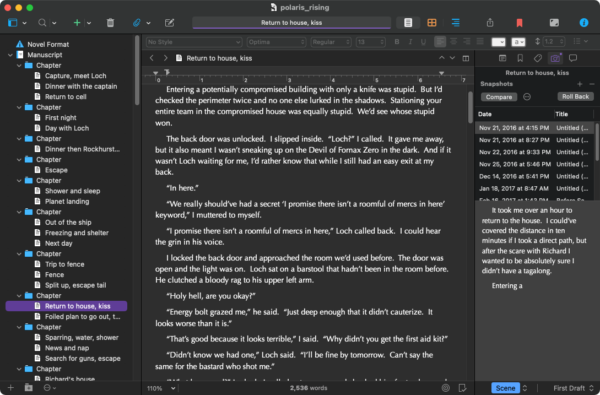Sticking the Grovel

Let’s talk about writing craft today, mostly because it’s on my mind thanks to a book by a new-to-me author I read this weekend. I’m not going to name the book, but I want to talk about writing romance in general, and romances with grovels in particular.
First a little groundwork. Genre romance often follows a series of story beats: the couple meets, sparks fly, and while they want to be together, generally something is holding them back. They try anyway or are forced into it somehow, and real affection starts to grow.
Then, right when you think everything is going to be okay: BLAMMO, the bleak moment (this is also called the black moment, but I prefer Alyssa Cole’s “bleak moment” nomenclature). Not every romance has one, but a lot of them do. It’s when all of the things that were originally keeping the couple apart come back around and smack them.
Handled well, the bleak moment has the ability to truly wrench the reader’s heart. That is one of the benefits of romance: no matter how dark the bleak moment may seem, you know they’re going to get together in the end, so you can really feel that sadness and anguish.
After the devastation of the bleak moment, the couple gets together again, stronger than before, and gets their happily ever after. If the bleak moment was caused by one of the main characters, then usually that character will have an epiphany where they realize they were in the wrong and apologize profusely while working like hell to win back their love. This is known as the grovel.
Once again, not all romance books have grovels, but in those that do, they need them to rebuild the trust between the main characters. The bigger—or more damaging—the bleak moment, the bigger the grovel needs to be, because we, as readers, want to believe the main characters love each other and are willing to crawl through fire to prove it. We want to see it, to see the changes love can work on someone.
And this is where things can go really sideways.
Because if the grovel doesn’t work, the whole book falls apart.
If I’ve made it through the bleak moment and the grovel and I still think one of the characters should be punted into the sun, then the romance is dead, and I’m mad, because I’ve spent hours rooting for these characters only to be disappointed.
In the book this weekend, the male main character (MMC), who up until that point had been very likable, did something I considered borderline unforgivable that left the female main character (FMC) devastated and sobbing in the street, which meant the grovel was going to need to be huge and heartfelt.
Instead, the FMC forgave him before he even apologized.
Ugh. UGH!
I skimmed the last ten percent of the book to see if it could be redeemed, but no. The MMC did eventually fix the thing he broke, but it had no impact because that was literally the bare minimum from which the rest of the grovel should’ve been built instead of the sum total of his effort.
So, how do you stick the grovel?
First, read a lot of romance. You should be doing that anyway, if you’re writing romance, and it’ll help you figure out what works and what doesn’t. The Fated Mates podcast did a whole episode on groveling, so if you need some recs, start there.
Then look at the stakes. If it’s a small misunderstanding, an apology and promise to do better is good enough, if you then show the character doing better. But if it’s a huge, heartbreaking moment that drags the reader through an emotional upheaval, then your grovel and resolution needs to be just as big and emotional.
And it needs to be believable. Romance readers are already rooting for the couple. We’re primed to believe they should be together, no matter the odds. But we also want to see that “oh, shit” epiphany and feel how far the MMC (usually) is willing to go to prove his love is true. We want to see him learn and change and grow. To be worthy of love and trust.
We don’t want him to be let off the hook, even—or maybe especially—if “he had good reasons.” Of course he had good reasons; it’s a romance! “Good reasons” come with the territory.
The character doing the groveling should rise from the ashes of the bleak moment with the absolute knowledge that they were wrong and they need to make amends lest they lose the one thing they value—the other MC. Then they should make those amends, to whatever degree necessary. And it should hurt. Not so much in a punitive way, but in a “this is new and scary and what if they don’t forgive me” way.
Baring your soul isn’t easy, change isn’t easy, and groveling shouldn’t be, either.
And while I’d like to tell you that it’s actually very easy to write, I’d be lying. It takes a great deal of skill to write a believable grovel that carries the reader from devastation to cautious hope to joy. But when done well, it appears effortless, like that was the only possible outcome, and of course it all worked out.
Because romance writers are a little bit magic. :)




